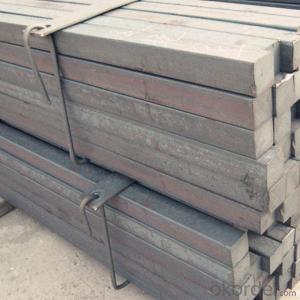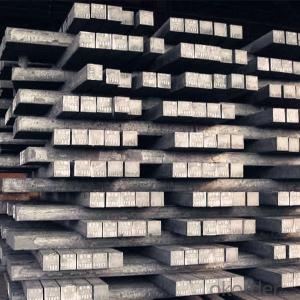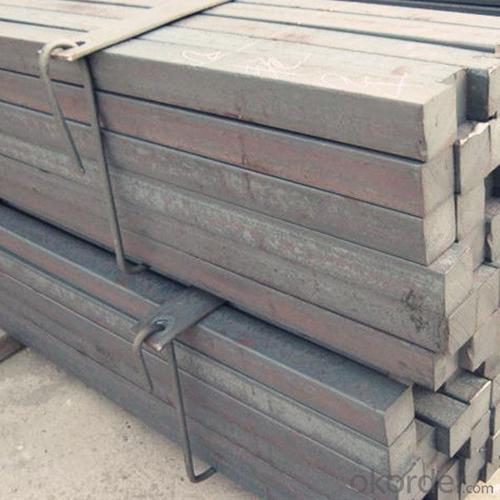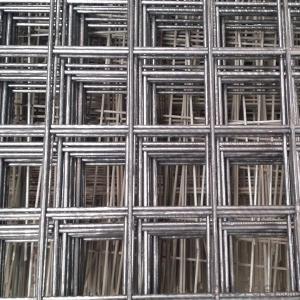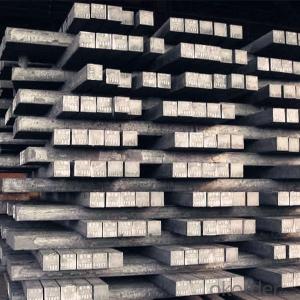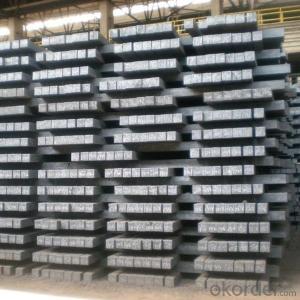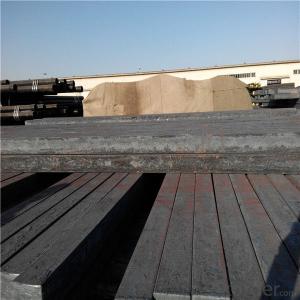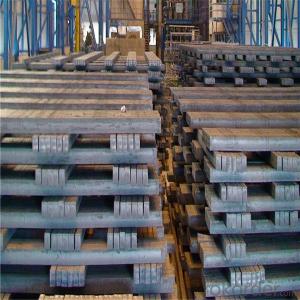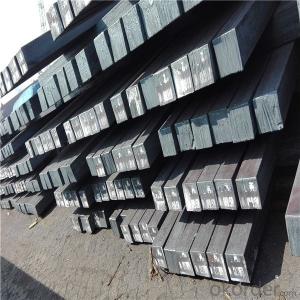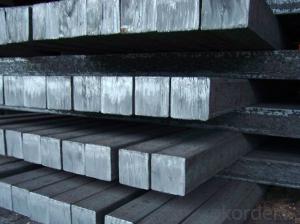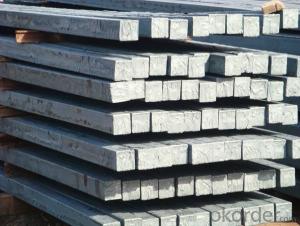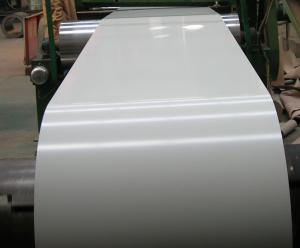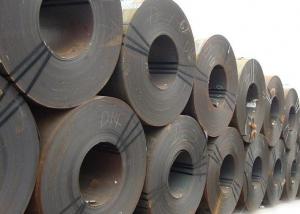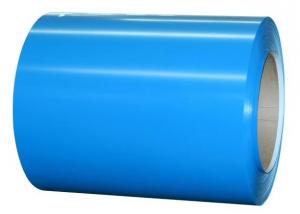Carbon steel billets, Alloy steel billets, Square steel billets
- Loading Port:
- China main port
- Payment Terms:
- TT OR LC
- Min Order Qty:
- 23 m.t.
- Supply Capability:
- 100000 m.t./month
OKorder Service Pledge
OKorder Financial Service
You Might Also Like
Specification
Carbon steel billets, Alloy steel billets, Square steel billets
Specifications:
Type | Steel billet / Square steel/ Steel square bar |
Standard grade | 3SP/PS, 5SP/PS, Q195, Q235, Q255, Q275, 20MnSi etc. |
MOQ | 1000 MT |
Technique | Hot rolled, Continuous casting and rolling |
Size | 50*50mm ~ 160*160mm |
Length | 3~12m |
Packing | Loose packing, in bundle |
Payment terms | T/T, L/C at sight, Usance L/C |
Trade terms | EXW, FOB, CFR, CIF |
Trans terms | FIO, FILO, FLT |
Inspection | Third party inspection accepted |
Delivery time | 15-30 days, according to the quantity |
Applications | carbon structural steel, wire rod, rod, deformed bars, profile steel, machine parts, and steel moulds etc . |
Note | Customized service is available (for sizes,length and chemical components etc.). |
Steel Grade:
Steel Grade | C % | Mn % | Si % | S % | P % |
Q195 | 0.06-0.12 | 0.25-0.50 | 0.30 Max | 0.04 Max. | 0.04 Max. |
Q235 | 0.12-0.22 | 0.30-0.60 | 0.30 Max. | 0.04 Max. | 0.04 Max. |
Q255 | 0.18-0.28 | 0.40-0.70 | 0.30 Max. | 0.045 Max. | 0.050 Max. |
Q275 | 0.27-0.38 | 0.50-0.80 | 0.30 Max. | 0.045 Max. | 0.045 Max. |
3SP | 0.14-0.22 | 0.40-0.85 | 0.15-0.30 | 0.050 Max. | 0.040 Max. |
5SP | 0.28-0.37 | 0.50-1.00 | 0.15-0.30 | 0.050 Max. | 0.040 Max. |
20MnSi | 0.17-0.25 | 1.00-1.60 | 0.40-0.80 | 0.050 Max. | 0.050 Max. |
Product Picture:
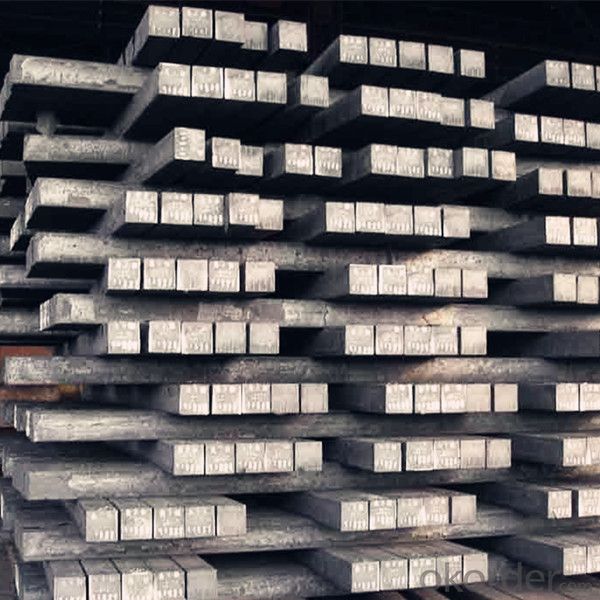
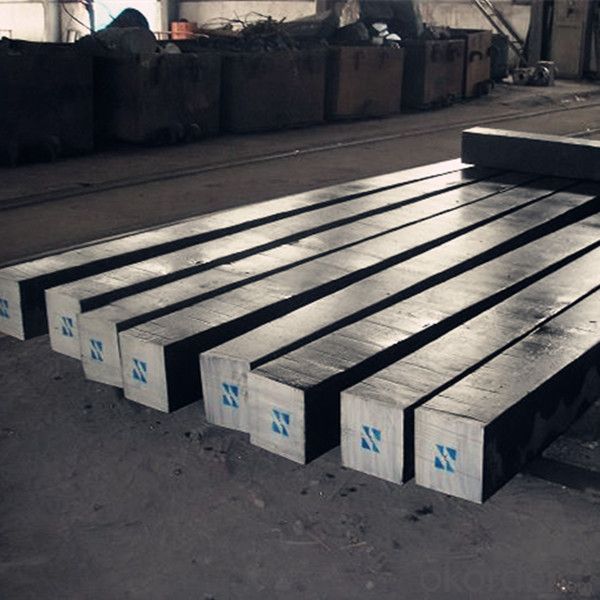
- Q: What are the different types of steel products used in the manufacturing of electronics?
- Some of the different types of steel products used in the manufacturing of electronics include stainless steel, carbon steel, and electrical steel. Stainless steel is commonly used for components that require corrosion resistance, such as enclosures and connectors. Carbon steel is used for structural components and fasteners due to its strength and affordability. Electrical steel, also known as silicon steel, is used for laminations in transformers and motors due to its magnetic properties.
- Q: How is steel used in the production of agricultural machinery and equipment?
- Steel is used extensively in the production of agricultural machinery and equipment due to its strength, durability, and versatility. It is used to construct the frames, bodies, and components of various agricultural machines such as tractors, harvesters, plows, and irrigation systems. Steel's robust nature allows these machines to withstand harsh environments, heavy loads, and repetitive use, ensuring they can operate efficiently for long periods. Additionally, steel can be easily shaped and welded, making it ideal for creating complex and custom parts required in agricultural equipment.
- Q: How does steel pipe threading work?
- Steel pipe threading is a process used to create threads on the ends of steel pipes. It typically involves using a die and a threading machine to cut the desired threads onto the pipe. The die is placed on the pipe and then the machine rotates the pipe while the die cuts the threads into the surface. This creates a threaded section on the pipe that can be used to connect it with other pipes or fittings. Threading is commonly used in various industries, including plumbing and construction, to ensure tight and secure connections between steel pipes.
- Q: What are the uses of steel wire mesh in agriculture?
- Steel wire mesh is used in agriculture for various purposes. It is commonly used to create fences and enclosures to keep animals out or protect crops from damage. Steel wire mesh is also used for trellising and supporting plants, allowing them to grow vertically and optimizing space utilization. Additionally, it can be used as a barrier to prevent soil erosion and as a protective covering for seedlings, shielding them from pests and harsh weather conditions. Overall, steel wire mesh plays a critical role in enhancing productivity, promoting plant growth, and maintaining the overall integrity of agricultural operations.
- Q: What are the advantages of using steel in the manufacturing of security doors and windows?
- The advantages of using steel in the manufacturing of security doors and windows include its high strength and durability, which provides excellent protection against forced entry. Additionally, steel is resistant to fire, corrosion, and extreme weather conditions, making it a reliable choice for long-lasting security solutions. Furthermore, steel's rigidity allows for the design of intricate locking mechanisms and reinforced frames, enhancing the overall security level.
- Q: What are the maintenance and care requirements for different steel products?
- The maintenance and care requirements for different steel products vary depending on their specific use and environment. However, some general maintenance practices for steel products include regular cleaning to remove dirt and debris, avoiding exposure to corrosive substances, applying protective coatings or paint to prevent rusting, and conducting routine inspections for any signs of damage or wear. Additionally, lubrication and proper storage can also contribute to prolonging the lifespan of steel products. It is always recommended to refer to the manufacturer's guidelines or consult with industry professionals for specific maintenance instructions tailored to each steel product.
- Q: What are the factors that affect the price of steel products?
- There are several factors that affect the price of steel products. These include the cost of raw materials, such as iron ore and coal, as well as energy prices and transportation costs. Other factors include supply and demand dynamics, global economic conditions, trade policies and tariffs, and the overall level of competition in the steel industry. Additionally, currency exchange rates and government regulations can also have an impact on steel prices.
- Q: How do steel products contribute to the construction of zoos and wildlife sanctuaries?
- Steel products are essential in the construction of zoos and wildlife sanctuaries as they provide strength, durability, and versatility. Steel is commonly used for constructing enclosures, fences, cages, and walkways, ensuring the safety and containment of animals while allowing visitors to observe them. Steel's ability to withstand harsh weather conditions and resist corrosion makes it ideal for outdoor structures, thereby ensuring the longevity of zoos and wildlife sanctuaries. Additionally, steel products are often used in the construction of support structures such as beams and columns, ensuring the stability of buildings and enclosures. Overall, steel products play a vital role in creating a secure and sustainable environment for both animals and visitors in zoos and wildlife sanctuaries.
- Q: What are the different types of steel sheets and their uses in the aerospace industry?
- There are several types of steel sheets used in the aerospace industry, including stainless steel, titanium, and aluminum alloys. Stainless steel sheets are often used in aircraft structures due to their high strength and resistance to corrosion. Titanium sheets are preferred for their lightweight properties and exceptional strength-to-weight ratio, making them suitable for critical components like landing gear and engine parts. Aluminum alloy sheets are commonly utilized for their low density, excellent formability, and good resistance to fatigue, making them ideal for aircraft skins and panels. Overall, each type of steel sheet has its unique characteristics that cater to specific needs within the aerospace industry.
- Q: What are the different types of steel cables and their uses?
- There are several types of steel cables commonly used in various applications. Some of the main types include galvanized steel cables, stainless steel cables, and carbon steel cables. Galvanized steel cables are coated with a layer of zinc to protect against corrosion, making them ideal for outdoor use or in environments with high moisture. Stainless steel cables are highly resistant to corrosion and are often used in marine, food processing, and medical industries. Carbon steel cables are strong and durable, making them suitable for heavy-duty applications such as construction, mining, and automotive industries. Each type of steel cable has its own unique properties and benefits, allowing them to be used in a wide range of industries and applications.
Send your message to us
Carbon steel billets, Alloy steel billets, Square steel billets
- Loading Port:
- China main port
- Payment Terms:
- TT OR LC
- Min Order Qty:
- 23 m.t.
- Supply Capability:
- 100000 m.t./month
OKorder Service Pledge
OKorder Financial Service
Similar products
Hot products
Hot Searches
Related keywords
